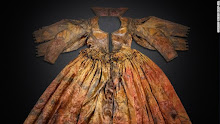This is the first of three excerpts from the “Goddess
Journey” chapter of my book-in-progress (tentatively titled) A Memory of Love: The Spiritual Journey of a
Princess. Enjoy....xo
GODDESS JOURNEY
{Part One}
“Diana was an ascendant female,”
explained Jungian scholar Josephine Evetts-Secker, “who could flout both the
patriarchy and matriarchal order, fulfilling and negating feminist ideals;
lauded as independent woman by some and by others castigated as a Barbie-doll
princess.” Naturally charismatic with “star quality,” Diana attracted a variety of stars from the
entertainment world—Elton John, Pavarotti and Freddie Mercury (there’s a story of
Diana going clubbing, in disguise, with Queen's lead singer and his pals)—just as she befriended well-known people who were “aspirants to justice” like Nelson Mandela and Mother Teresa.
Writing in her essay “The People’s Princess,” Evett-Secker continued: “She
bridged the glittery world of fashion and the seat of Establishment power. She
was as much the female trickster as goddess; so seen, so mysterious, hiding
quixotically behind apparent transparency; unconsciously manipulating
concealment and revelations, echoing archaic mystery conventions.”
Like many scholars from the Jungian
school of thought, Evetts-Secker compared Diana to various goddess archetypes. To
Aphrodite, who “dissolved resistance” and inspired a dynamic of “an ancient
strategy, through love to power.” To “girlish Persephone” because of Diana’s
playfulness while tiptoeing around danger, and to Demeter as “the raging mother
protecting her sons from public assault by those who wanted to peddle their
images.”
As a daughter, sister, friend,
bride, princess, wife, mother, divorcée, lover, fashion-plate, healer and
ambassador, Diana’s life stages, her womanly rites of passages, were lived out
in a world arena for all to see. And since her life was and still is examined
like few others, its complexity offers an intriguing milieu, connecting the
spirit of all women. “Diana was a divided, unhappy and bewildered Princess,”
Evett-Secker added, “as well as an ebullient beauty, graceful, opulent and full
of vivid, if vulnerable and threatened, life.”
Or as counselor Steffan Vanel stated
in his book, Charles and Diana, An Inside
Story: An Astrological-Karmic View: “Diana embodied a complexity of
contradictions which would enable virtually everyone to see and hear their own
story or agenda in her life.” Diana’s contradictions were indeed our own.
Ann Shearer, writing through a Jungian lens about her observances of Diana’s memorial service, noted the paradoxical images used about the late princess, from powerful goddess to helpless victim. “And here is a central paradox: the forces of unity that ‘Diana’ became grew the stronger for the very complexity of contradictions she contained. As we learned more of her real and fictitious selves,” Shearer continued in her “Tales of the Unfolding Feminine” essay, “and the legends around her grew, she carried for us an incontestable truth: that we humans must struggle with a mass of inconsistencies within ourselves and somehow learn to honour them.”
Ann Shearer, writing through a Jungian lens about her observances of Diana’s memorial service, noted the paradoxical images used about the late princess, from powerful goddess to helpless victim. “And here is a central paradox: the forces of unity that ‘Diana’ became grew the stronger for the very complexity of contradictions she contained. As we learned more of her real and fictitious selves,” Shearer continued in her “Tales of the Unfolding Feminine” essay, “and the legends around her grew, she carried for us an incontestable truth: that we humans must struggle with a mass of inconsistencies within ourselves and somehow learn to honour them.”
Another Jungian analyst, Ian Alister,
shared this take in his essay “Your Cheating Heart” from When A Princess Dies:
An extraordinary feature of Diana’s
life, from her engagement to her death, was the extent of public exposure,
providing many personal details and characteristics which could act as pegs for
our own individual projections. It had all the qualities of a soap opera except
that this was real. We could watch this drama which involved the suffering and
sacrifice of a person who carries a symbolic charge for most of us, whether
consciously or not. We can feel it, think about it, and try to relate it to
continuous psychological processes within us. To make sense of it in this way,
to give it meaning, is part of our struggle to make body and mind whole.
Perhaps that was a gift of Diana’s life, in support of both women and men, then and now, to “make sense of” and to honor our “whole”—body, mind and spirit. And, in turn, a deepening of soul. It’s an inner
journey calling forth our wise intuitive intelligence and a depth of feminine-grounded compassion, tapping into
mythological longings and long-ago legends that can reveal a magnificent
peeling-away-of-layers kind of journey. A journey where we all can hear the call of the goddess.
In the words of Rumi, the thirteenth-century Sufi
mystic: “There’s a voice that doesn’t use words. Listen to it, as the personal
self breaks open.” Such a break open of self holds the possibility of an
extraordinary rite of passage into an intimate journey, measured only by the
level of our courage, where we just might discover the authentic spirit of, for men, the empathetic side of masculinity, and for women, the authentic spirit of our womanliness, indeed, our own goddess nature. Not unlike one princess-swirled exploration in all its archetypal glory once upon a time.
[Part Two next time, “The Reappearing Goddess”...then Part Three, “Glorious Inanna”]



























